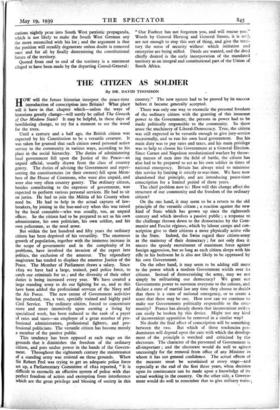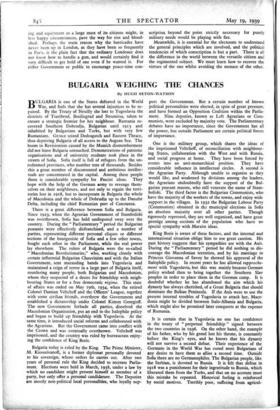THE CITIZEN AS SOLDIER
By DR. DAVID THOMSON
110W will the future historian interpret the peace-time introduction of conscription into Britain? What place will it have in that chapter which—unless the ways of historians greatly change—will surely be called The Growth of Our Modern State? It may be helpful, in these days of bewildering change, to try for a moment to see the wood for the trees.
Until a century and a half ago, the British citizen was expected by his Constitution to be a versatile creature. It was taken for granted that each citizen owed personal active service to the community in various ways, according to his place in the social hierarchy. The duties of administering local government fell upon the Justice of the Peace—an unpaid official, usually drawn from the class of country gentry. The duties of advising the Government and repre- senting the constituencies (or their owners) fell upon Mem- bers of the House of Commons, who were also unpaid, and were also very often country gentry. The ordinary citizen, besides contributing to the expenses of government, was expected to perform various personal services. He had to sit on juries. He had to join the Militia of his County when need be. He had to help in the actual capture of law- breakers, by joining in the hue-and-cry when this was raised by the local constable—who was usually, too, an unpaid officer. So the citizen had to be prepared to act as his own administrator, his own politician, his own soldier, and his own policeman, as the need arose.
But within the last hundred and fifty years the ordinary citizen has been deprived of his versatility. The enormous growth of population, together with the immense increase in the scope of government and in the complexity of its problems, have involved the invasion of the expert into politics, the exclusion of the amateur. The stipendiary magistrate has tended to displace the amateur Justice of the Peace. The Member of Parliament draws a salary. Since 1829 we have had a large, trained, paid police force, to catch our criminals for us ; and the diversity of their other duties is being increased every year. We have created a large standing army to do our fighting for us, and to this have been added the professional services of the Navy and the Air Force. The new extent of Government activities has produced, too, a vast, specially trained and highly paid Civil Service. The ordinary citizen, forced to concentrate more and more intensively upon earning a living by specialised work, has been reduced to the rank of a payer of rates and taxes—an employer of a great number of pro- fessional administrators, professional fighters, and pro- fessional politicians. The versatile citizen has become merely a member of the passive public.
This tendency has been opposed at each stage on the grounds that it diminishes the freedom of the ordinary citizen, and puts undue power in the hands of the Govern- ment. Throughout the eighteenth century the maintenance of a standing army was resisted on these grounds. When Sir Robert Peel was trying to get an adequate police force set up, a Parliamentary Committee of 1822 reported, "It is difficult to reconcile an effective system of police with that perfect freedom of action and exemption from interference which are the great privilege and blessing of society in this country." The new system had to be proved by its success before it became generally accepted.
There was only one way to reconcile the personal freedom of the ordinary citizen with the granting of this immense power to the Government; the persons in power had to be made politically responsible to the community. So there arose the machinery of Liberal-Democracy. True, the citizen was still expected to be versatile enough to give jury-service occasionally, and to run his own local government. But his main duty was to pay rates and taxes, and his main privilege was to help to choose his Government at a General Election. Since Camot and Napoleon revolutionised warfare by throw- ing masses of men into the field of battle, the citizen has also had to be prepared to act as his own soldier in times of national emergency. Britain has always tried to minimise this service by limiting it strictly to war-time. We have now abandoned that principle, and are introducing peace-time conscription for a limited period of three years.
The chief problem now is: How will this change affect the structure of our community and the freedom of the ordinary citizen?
On the one hand, it may seem to be a return to the old principle of the versatile citizen ; a reaction against the new kind of State which has grown up since the eighteenth century and which involves a passive public ; a response to the challenge thrown down to the democracies by the Com- munist and Fascist regimes, which by labour camps and con- scription give to their citizens a more physically active role in the State. Indeed, the Swiss regard their citizen-army as the mainstay of their democracy ; for not only does it ensure the speedy recruitment of maximum force against foreign aggression, but so long as each citizen sleeps with his rifle in his bedroom he is also not likely to be oppressed by his own Government.
On the other hand, it may seem to be adding still more to the power which a modern Government wields over its citizens. Instead of democratising the army, may we not simply be militarising our democracy? We grant our Governments power to summon everyone to the colours, and declare a state of martial law any time they choose to decide that there is a state of national emergency, or to create a scare that there may be one. How now can we continue to make our Governments politically responsible to the com- munity? France has already shown that inconvenient strikes can easily be broken by this device. Might not any kind of inconvenient opposition be removed in a similar way?
No doubt the final effect of conscription will be something between the two. But which of these tendencies pre- dominates will depend upon the care with which the develop- ment of the principle is watched and criticised by the electorate. The character of the personnel of Government is all-important ; and the electorate would do well to agitate unceasingly for the removal from office of any Minister in whom it has not general confidence. The actual effects of the measure must be scrutinised at every stage—and especially at the end of the first three years, when decision upon its continuance can be made upon a knowledge of its actual working in the country. On the other side, a Govern- ment would do well to remember that to give military train- ing and equipment to a large mass of its citizens might, in less happy circumstances, pave the way for riot and blood- shed. Perhaps the main reason why the barricades have never been up in London, as they have been so frequently in Paris, is the plain fact that the ordinary Londoner does not know how to handle a gun, and would certainly find it very difficult to get hold of one even if he wanted it. For either Government or public to encourage peace-time con- scription beyond the point strictly necessary for purely military needs would be playing with fire.
Meanwhile, it is essential for the electorate to understand the general principles which are involved, and the political tendencies of which conscription is but a part. There is all the difference in the world between the versatile citizen and the regimented subject. We must learn how to recover the virtues of the one whilst avoiding the menace of the other.



















































 Previous page
Previous page